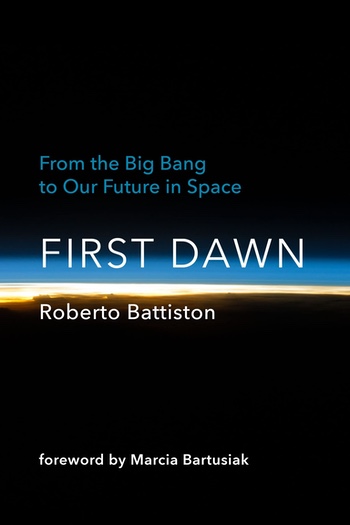 |
Review: First Dawn
by Jeff Foust
Monday, September 26, 2022
First Dawn: From the Big Bang to Our Future in Space
by Roberto Battiston, translated by Bonnie McClellan-Broussard
MIT Press, 2022
hardcover, 216 pp.
ISBN 978-0-262-04721-0
US$29.99
In contrast to astronauts, many of whom have written memoirs, few space agency leaders write books about their time in office or other topics, like former NASA deputy administrator Lori Garver in Escaping Gravity. An exception to this is Roberto Battiston, a physicist who spent four years as the president of the Italian space agency ASI and has written numerous essays and books on space and science topics. The latest, First Dawn, is now available in English.
The book is not a memoir, although he discusses some experiences he had during his time leading ASI in later chapters of the book. Instead, in nearly three dozen relatively short chapters, he takes the reader on a meandering path from cosmology to astrobiology to spaceflight and space policy.
| “The questions we ask ourselves are very similar to those asked by the philosophers of ancient Greece,” he writes, such as the nature of matter. “However, the context has changed, thanks to the development of experimental science.” |
Much of the book is fairly straightforward, as Battiston discusses the Big Bang and the evolution of the early universe, then moves to the formation of the Sun, our solar system, and the development of life on Earth and prospects of it elsewhere. Halfway into the book, he suddenly shifts back out to cosmology, discussing dark matter and dark energy, black holes, and related topics. That allows him to go into his participation on the Alpha Magnetic Spectrometer project, a particle physics experiment on the International Space Station for more than a decade.
Battiston treads familiar ground for most of those chapters, with few new revelations about the cosmos, although an occasional insight. “The questions we ask ourselves are very similar to those asked by the philosophers of ancient Greece,” he writes, such as the nature of matter. “However, the context has changed, thanks to the development of experimental science. Four centuries after Galileo, today we know how to question nature and how to read the mathematical characters with which its book is written.”
What may be most interesting to readers are some of his views on space exploration and commercialization in the book’s final chapters, leveraging his time leading ASI. He recalls visiting SpaceX’s headquarters for meetings with Elon Musk and other executives, coming away highly impressed with the company and the facility (even if he says that plant is located “in the southern part of San Francisco”; Hawthorne, California, is in the Los Angeles area.) He notes he attended closed-door meetings there along with NASA and other space agencies and various companies—including Caterpillar, the construction machinery company—to discuss exploring and settling Mars. “In Europe,” he laments, “I have found myself participating in this type of discussion only in the context of universities and the research world.”
Europe, he writes, missed the boat on reusability: there was little discussion of it, he recalls, at an ESA ministerial meeting in 2014 that led to development of the Ariane 6 as Europe’s response to the Falcon 9; a year after that meeting, SpaceX landed its first booster. There was also a missed opportunity with smallsats, he argues, comparing the rise of Earth imaging company Planet, born from projects at NASA Ames, with the struggle to secure Italian government support for a smallsat project at the Terni location of the University of Perugia. “By mentioning this I certainly don’t mean to imply that an impressive and ambitious project like Planet Labs could have started in Terni, but in all honesty, I cannot rule it out,” he writes.
Those insights near the end of First Dawn help keep it from being just a run-of-the-mill space science book. One wonders what other glimpses behind the scenes of spaceflight we might get if more former space agency leaders started writing books.
Note: we are using a new commenting system, which may require you to create a new account.
No comments:
Post a Comment